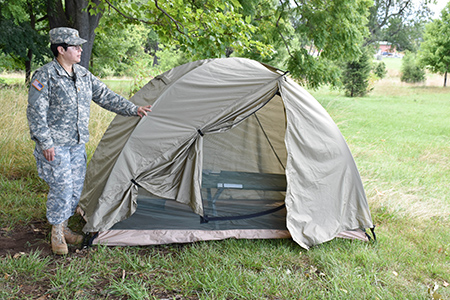Bed Nets Keep Out Unwanted Visitors

It's that time of year to enjoy the great outdoors, which unfortunately means having to share all the fun with the pesky bugs that also come out. Our standard summer arsenal includes citronella candles and bug spray in an attempt to keep insects at bay. Despite our best efforts, we still end up with bites that make us itch. Alas, we just take them in stride.
It's not so simple for Soldiers stationed in South East Asia, South America and other parts of the world where exposure to disease-carrying mosquitoes could mean serious illness and even death. These pests carry malaria, dengue fever, Japanese encephalitis and other diseases. Soldiers wear uniforms treated with repellant during the day, but what protection do they have at night?
Due to the efforts of the U.S. Army Medical Materiel Development Activity's Medical Support Systems Project Management Office, in partnership with the Military Operational Medicine Research Program, Walter Reed Army Institute of Research and Triton Systems, Inc., Soldiers can be issued an Egret bed net to keep them safe. The bed net is an all-encompassing tent-like apparatus, with a floor made of rip-stop fabric and walls made of netting.
Since the original bed nets became available, new modifications have been made. Whereas the original nets were treated with Permethrin, the newer nets are also impregnated with Deltamethrin. The chemicals work to repel mosquitoes, which then fly away and die from exposure within twenty-four hours.
"The two insecticides work synergistically, so that you can put lower quantities of both and still get the same repellency and efficacy," says Alan Harner, MSS PMO product manager.
According to Harner, as part of the requirements set by the Armed Forces Pest Management Board, a year and a half of testing was conducted and approval by the Environmental Protection Agency had to be obtained. The AFPMB has jurisdiction over any insecticide-related products that need a National Stock Number, which is required for a product to be offered in the military inventory. The presentation made to the board had to include toxicology reports showing that humans are safe from the chemicals.
Another feature added to the setup came as a request from users in the field. While bed nets are typically used indoors, users wanted something to protect them from the elements, when the bed net was used outside. Thus, the rain fly was introduced. The rain fly is made from rip-stop fabric and covers the whole bed net. While it does not contain any insecticides itself, it also does not affect the bed net's ability to repel mosquitoes.
According to Spc. Anthony Wiesen of the 758th Forward Surgical Team, it's nice to have the rain fly, because it turns the bed net into one's own personal tent. Not only does the rain fly protect against moisture, it also blocks the light for sleeping and provides privacy for changing. Because there is a floor, items can be stored underneath the cot. There are also tabs attached to the net on which the Soldier can hang things off the ground.
The bed net weighs less than five pounds, so it is light enough for the Soldier to carry. It is also easy for one person to assemble and take apart in five minutes. It will hold a cot and is tall enough for the Soldier to be able to sit up while in bed. One additional improvement is that the holes in the net have been enlarged to allow for good air-circulation.
Whether the bed net is used inside a larger tent, temporary shelter or outside, Soldiers will be safe from disease-carrying mosquitoes, and that is one less enemy for them to worry about.













